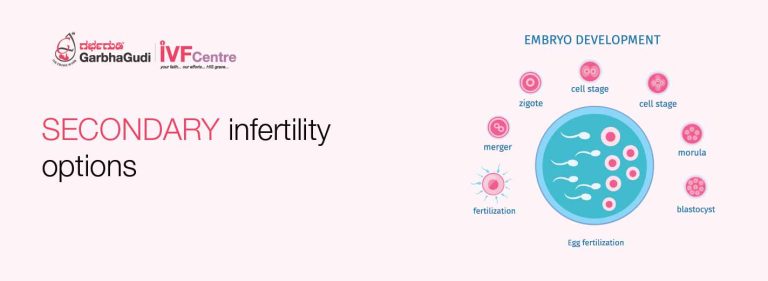Know about secondary infertility

Secondary Infertility
It is a widespread assumption that there is no chance of infertility if one has had a child. However, when a woman finds it difficult to conceive a second child despite continued efforts when the clock starts ticking, it is time to consider getting tested for infertility issues. Yes, if one is unable to conceive a child or, if conceived, unable to carry it to full term, it leads to thinking that one is probably going through secondary infertility. The inability to conceive or deliver a child after having previously given birth to a child is termed Secondary Infertility. Nevertheless, there is always light at the end of the tunnel. It is treatable and can render one the joy of having a second baby. As per survey and analysis, approximately 10% of women worldwide experience secondary infertility. There are a lot of causes of secondary infertility.
Causes Of Secondary Infertility:
Quite often, the causes of secondary infertility are no different from those of primary. However, these problems seem to occur a little later in cases of secondary infertility. Both the male and the female could contribute to secondary infertility issues. Some the of most common causes that women are:
• Ovulation disorder: Quality and number of eggs. It is well known that a female is born with a certain number of eggs that diminish over a period, and on approaching 40s and above, these eggs decrease furthermore, and those left are prone to chromosomal disorders.
• Endometriosis: A painful condition when the endometrial tissue begins to grow outside the uterus, leading to adhesions and scar tissue formation.
• Pelvic inflammatory diseases: A condition that refers to infection of the reproductive organs – the vagina, fallopian tubes, or uterus.
• Uterine fibroids: These are noncancerous growths that occur in the uterus.
• Blocked fallopian tubes: The tube that plays a vital role in conception gets blocked by scar tissue due to infection or surgery. This blockage interrupts the fertilization process, thereby leading to infertility problems.
• PCOS: A hormonal disorder that is characterized by abnormal menstrual periods and dominance of male hormones.
• Recurrent miscarriages: It is the loss of two or more subsequent pregnancies and can be due to uterine abnormalities, genetic or chromosomal disorders of the embryo, and the autoimmune problem of the mother
• Breastfeeding: Only breastfeeding the baby can cause ovulation to cease.
• Thyroid disorders: Low level of thyroid hormone can interrupt the release of the egg from the ovary
• Weight gain/loss: Normally, after the first baby, most women gain weight, and due to this, they begin workouts to lose fat and sometimes lose even the fat that might be necessary for the body. Hence, unintentional or unexplained weight gain/loss leads to infertility. Therefore, one needs to have a watchful eye on the weight and maintain an adequate BMI if planning for a second baby.
• Lifestyle: Sedentary lifestyle leads to obesity which in turn causes infertility.
Some of the major causes where a male can contribute towards secondary infertility are:
• Decrease quality, quantity, and motility of sperm: The sperm should be healthy enough to travel and break through the egg to get the egg fertilized and if the quality and motility of sperm are weak, then the sperm would die in the pathway.
• Reduced testosterone levels: To produce sperm, testosterone levels should be maintained within the normal range.
• Injury to genitals.
• Varicocele: It is the enlargement of the veins within the scrotum, it causes a decrease in quality and quantity of sperms.
• Prostate disorders: such as inflammation of the prostate (prostatitis) or benign prostatic hyperplasia (BPH), which is an enlargement of the prostate can also cause infertility.
• Diminishing quality of semen.
• Hypogonadism: An abnormal condition in which the male body is unable to produce sufficient hormones that are important for growth and development, and consequently can affect the production of sperms.
• Use of certain lubricants during sexual intercourse.
• Lifestyle: Adopting an unhealthy lifestyle in terms of diet, clothing, use of illicit substances, excessive tobacco or alcohol use can cause infertility issues.
• Weight gain: Obesity leads causes decreased sperm count and quality in men
Despite all the above, a timely diagnosis and proper treatment can provide a quick solution. Both the woman and the man need to undergo testing to determine the underlying problem to begin the treatment process. Similar to primary infertility, there are numerous options to treat secondary infertility. These could include”
• Drugs to enhance and improve fertility.
• Surgeries if needed to repair or resolve certain conditions.
• Assisted reproductive technology to include IVF (in vitro fertilization), IUI (intrauterine insemination), intrafallopian gamete transfer (GIFT), frozen embryo transfer (FET), zygote intrafallopian transfer (ZIFT), ISI (Intracytoplasmic sperm injection)
All that one requires is the right fertility specialist and the centre. GarbhaGudi is one of the best choices for dealing with primary and secondary infertility issues. The problem of secondary infertility should no more be a stumbling block stopping one from having a baby again. No second thought to double up the joy with planning a second baby. GarbhaGudi is one of Bangalore’s best IVF centres with state-of-the-art technology and experts on board.